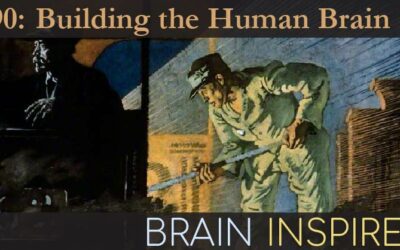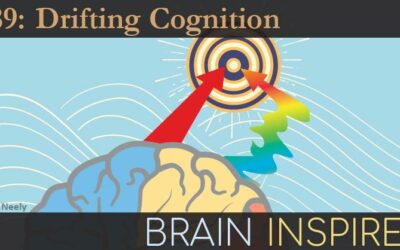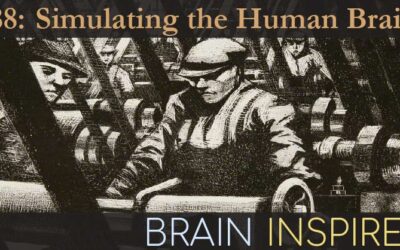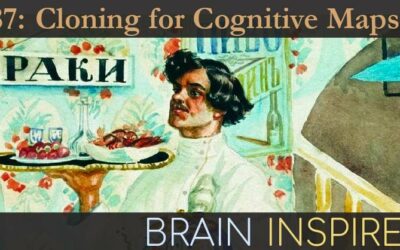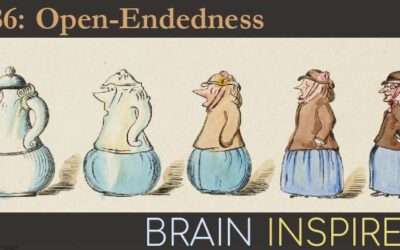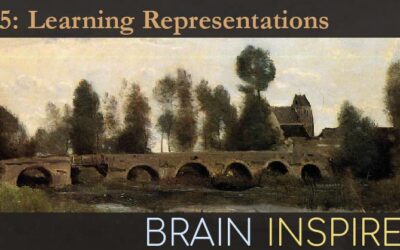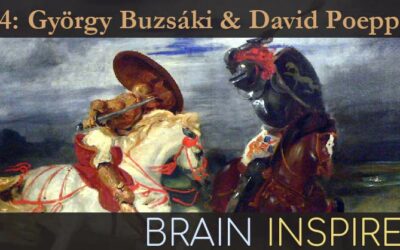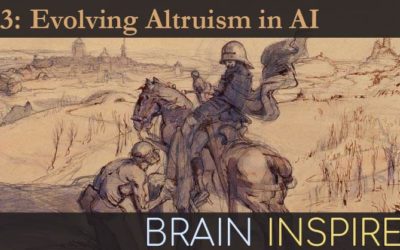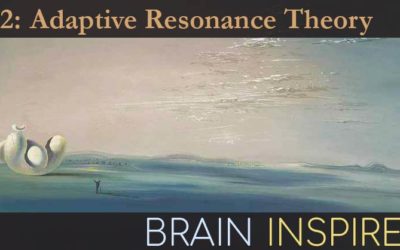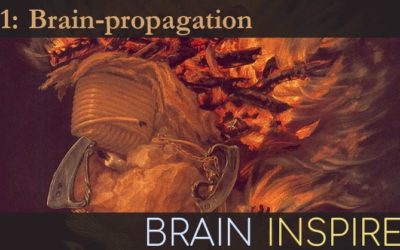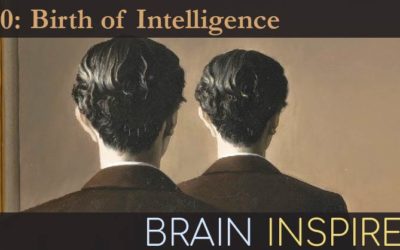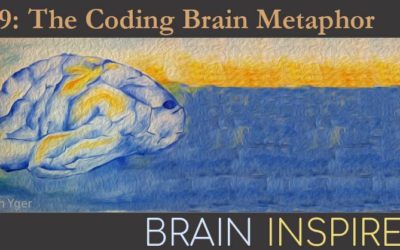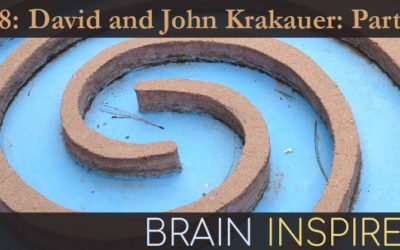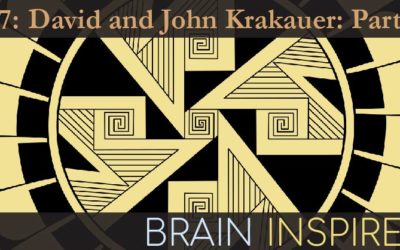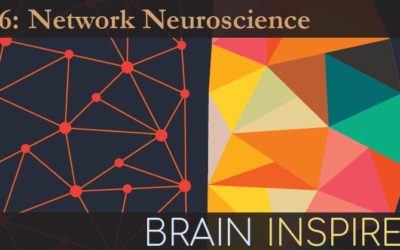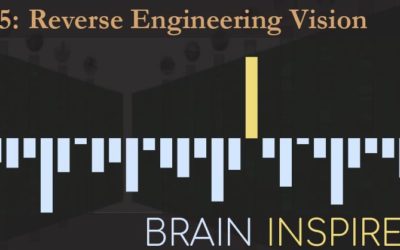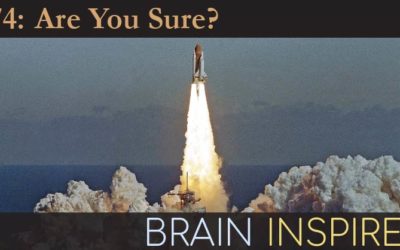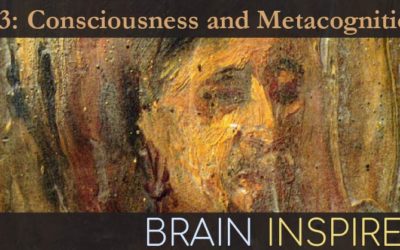All Episodes
BI 090 Chris Eliasmith: Building the Human Brain
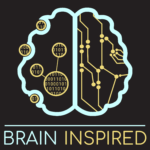
Chris and I discuss his Spaun large scale model of the human brain (Semantic Pointer Architecture Unified Network), as detailed in his book How to Build a Brain. We talk about his philosophical approach, how Spaun compares to Randy O’Reilly’s Leabra networks, the Applied Brain Research Chris co-founded, and I have guest questions from Brad Aimone, Steve Potter, and Randy O’Reilly.
BI 089 Matt Smith: Drifting Cognition

Matt and I discuss how cognition and behavior drifts over the course of minutes and hours, and how global brain activity drifts with it. How does the brain continue to produce steady perception and action in the midst of such drift? We also talk about how to think about variability in neural activity. How much of it is noise and how much of it is hidden important activity? Finally, we discuss the effect of recording more and more neurons simultaneously, collecting bigger and bigger datasets, plus guest questions from Adam Snyder and Patrick Mayo.
BI 088 Randy O’Reilly: Simulating the Human Brain

Randy and I discuss his LEABRA cognitive architecture that aims to simulate the human brain, plus his current theory about how a loop between cortical regions and the thalamus could implement predictive learning and thus solve how we learn with so few examples. We also discuss what Randy thinks is the next big thing neuroscience can contribute to AI and much more.
BI 087 Dileep George: Cloning for Cognitive Maps

When a waiter hands me the bill, how do I know whether to pay it myself or let my date pay? On this episode, I get a progress update from Dileep on his company, Vicarious, since Dileep’s last episode. We also talk broadly about his experience running Vicarious to develop AGI and robotics. Then we turn to his latest brain-inspired AI efforts using cloned structured probabilistic graph models to develop an account of how the hippocampus makes a model of the world represents our cognitive maps in different contexts, so we can simulate possible outcomes to choose how to act.
BI 086 Ken Stanley: Open-Endedness

Ken and I discuss open-endedness, the pursuit of ambitious goals by seeking novelty and interesting products instead of advancing directly toward defined objectives. We talk about evolution as a prime example of an open-ended system that has produced astounding organisms, Ken relates how open-endedness could help advance artificial intelligence and neuroscience, and we discuss a range of topics related to the general concept of open-endedness, and Ken takes a couple questions from Stefan Leijnen and Melanie Mitchell.
BI 085 Ida Momennejad: Learning Representations

Ida and I discuss the current landscape of reinforcement learning in both natural and artificial intelligence, and how the old story of two RL systems in brains – model-free and model-based – is giving way to a more nuanced story of these two systems constantly interacting and additional RL strategies between model-free and model-based to drive the vast repertoire of our habits and goal-directed behaviors. We discuss Ida’s work on one of those “in-between” strategies, the successor representation RL strategy, which maps onto brain activity and accounts for behavior. We also discuss her interesting background and how it affects her outlook and research pursuit, and the role philosophy has played and continues to play in her thought processes.
BI 084 György Buzsáki and David Poeppel

David, Gyuri, and I discuss the issues they argue for in their back and forth commentaries about the importance of neuroscience and psychology, or implementation-level and computational-level, to advance our understanding of brains and minds – and the names we give to the things we study. Gyuri believes it’s time we use what we know and discover about brain mechanisms to better describe the psychological concepts we refer to as explanations for minds; David believes the psychological concepts are constantly being refined and are just as valid as objects of study to understand minds. They both agree these are important and enjoyable topics to debate.
BI 083 Jane Wang: Evolving Altruism in AI

Jane and I discuss the relationship between AI and neuroscience (cognitive science, etc), from her perspective at Deepmind after a career researching natural intelligence. We also talk about her meta-reinforcement learning work that connects deep reinforcement learning with known brain circuitry and processes, and finally we talk about her recent work using evolutionary strategies to develop altruism and cooperation among the agents in a multi-agent reinforcement learning environment.
BI 082 Steve Grossberg: Adaptive Resonance Theory

Steve and I discuss his long and productive career as a theoretical neuroscientist. We cover his tried and true method of taking a large body of psychological behavioral findings, determining how they fit together and what’s paradoxical about them, developing design principles, theories, and models from that body of data, and using experimental neuroscience to inform and confirm his model predictions. We talk about his Adaptive Resonance Theory (ART) to describe how our brains are self-organizing, adaptive, and deal with changing environments. We also talk about his complementary computing paradigm, how the resonant states in ART support consciousness, his place in the history of both neuroscience and AI, and quite a bit more.
BI 081 Pieter Roelfsema: Brain-propagation

Pieter and I discuss his ongoing quest to figure out how the brain implements learning that solves the credit assignment problem, like backpropagation does for neural networks. We also talk about his work to understand how we perceive individual objects in a crowded scene, his neurophysiological recordings in support of the global neuronal workspace hypothesis of consciousness, and the visual prosthetic device he’s developing to cure blindness by directly stimulating early visual cortex.
BI 080 Daeyeol Lee: Birth of Intelligence

Daeyeol and I discuss his book Birth of Intelligence: From RNA to Artificial Intelligence, which argues intelligence is a function of and inseparable from life, bound by self-replication and evolution. The book covers a ton of neuroscience related to decision making and learning, though we focused on a few theoretical frameworks and ideas like division of labor and principal-agent relationships to understand how our brains and minds are related to our genes, how AI is related to humans (for now), metacognition, consciousness, and a ton more.
BI 079 Romain Brette: The Coding Brain Metaphor

Romain and I discuss his theoretical/philosophical work examining how neuroscientists rampantly misuse the word “code” when making claims about information processing in brains. We talk about the coding metaphor, various notions of information, the different roles and facets of mental representation, perceptual invariance, subjective physics, process versus substance metaphysics, and the process of writing a Behavior and Brain Sciences article (spoiler: it’s a demanding yet rewarding experience).
BI 078 David and John Krakauer: Part 2

In this second part of our conversation David, John, and I continue to discuss the role of complexity science in the study of intelligence, brains, and minds. Be sure to listen to the first part, which lays the foundation for what we discuss in this episode.
BI 077 David and John Krakauer: Part 1

David, John, and I discuss the role of complexity science in the study of intelligence. In this first part, we talk about complexity itself, its role in neuroscience, emergence and levels of explanation, understanding, and really quite a bit more.
BI 076 Olaf Sporns: Network Neuroscience

Olaf and I discuss the explosion of network neuroscience, which uses network science tools to map the structure (connectome) and activity of the brain at various spatial and temporal scales. We talk about the possibility of bridging physical and functional maps via communication dynamics, and about the relation between network science and artificial neural networks and plenty more.
BI 075 Jim DiCarlo: Reverse Engineering Vision

Jim and I discuss his reverse engineering approach to visual intelligence, using deep models optimized to perform object recognition tasks. We talk about the history of his work developing models to match the neural activity in the ventral visual stream, how deep learning connects with those models, and some of his recent work: adding recurrence to the models to account for more difficult object recognition, using unsupervised learning to account for plasticity in the visual stream, and controlling neural activity by creating specific images for subjects to view.
BI 074 Ginger Campbell: Are You Sure?

Ginger and I discuss her book Are You Sure? The Unconscious Origins of Certainty, which summarizes Richard Burton’s work exploring the experience and phenomenal origin of feeling confident, and how the vast majority of our brain processing occurs outside our conscious awareness.
BI 073 Megan Peters: Consciousness and Metacognition

Megan and I discuss her work using metacognition as a way to study subjective awareness, or confidence. We talk about how our decisions are related to our confidence, the current state of the science of consciousness, and her newest project using fMRI decoded neurofeedback to induce particular brain states in subjects so we can learn about conscious and unconscious brain processing.
